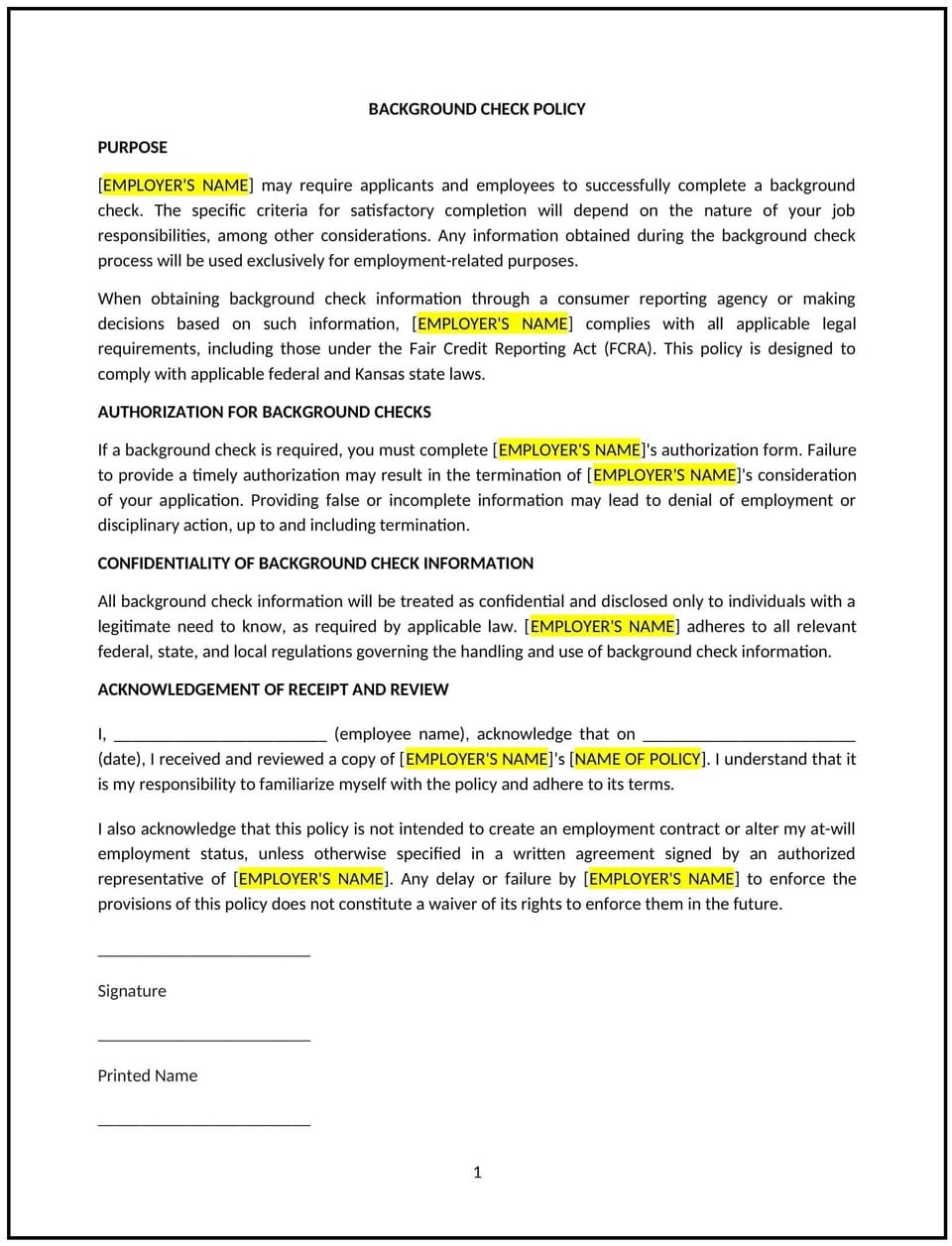Background check policy (Kansas): Free template

Background check policy (Kansas)
A background check policy helps Kansas businesses establish clear guidelines for screening potential employees, vendors, or contractors before hiring or engagement. This policy outlines the scope of background checks, permissible screening methods, and procedures for handling findings while maintaining fairness and compliance with applicable laws.
By implementing this policy, businesses can make informed hiring decisions, reduce risks, and create a safer, more reliable workplace.
How to use this background check policy (Kansas)
- Define the purpose: Businesses should specify why background checks are conducted, such as verifying qualifications, assessing potential risks, or maintaining workplace security.
- Identify the scope: Businesses should clarify which positions or roles require background checks and the types of screenings that will be conducted, such as criminal history, education verification, or credit checks.
- Establish a screening process: Businesses should outline the steps for conducting background checks, including obtaining necessary permissions from candidates and ensuring checks are relevant to the role.
- Set review criteria: Businesses should define how background check results will be evaluated, including factors like the nature and timing of offenses, relevance to the job, and any mitigating circumstances.
- Provide applicant rights: Businesses should inform candidates about their rights regarding background checks, including access to their reports and the ability to dispute inaccuracies.
- Maintain confidentiality: Businesses should ensure that all background check information is handled securely and shared only with authorized personnel.
- Review and update regularly: Businesses should periodically assess the policy to reflect changes in hiring practices and legal considerations.
Benefits of using a background check policy (Kansas)
- Supports informed hiring decisions: Helps businesses assess candidates’ qualifications and potential risks before employment.
- Reduces workplace risks: Identifies potential safety or security concerns before bringing employees, vendors, or contractors into the workplace.
- Protects company reputation: Reduces the likelihood of hiring individuals with histories that could negatively impact the business.
- Establishes a consistent hiring process: Provides clear guidelines to ensure all candidates are screened fairly and equitably.
- Strengthens workplace security: Helps businesses confirm that employees meet safety and trustworthiness standards.
- Promotes transparency: Clearly defines how background check information is used and what factors are considered in decision-making.
Tips for using this background check policy (Kansas)
- Communicate expectations early: Businesses should inform job applicants and employees about background check requirements before initiating the process.
- Use screenings relevant to the job: Background checks should be limited to information directly related to the responsibilities of the position.
- Ensure fair evaluation: Businesses should consider the context of background check findings rather than making automatic disqualifications.
- Provide clear authorization forms: Candidates should be given proper disclosure and an opportunity to consent before any screening is conducted.
- Maintain confidentiality: Background check results should only be accessible to authorized decision-makers and stored securely.
- Regularly review the process: Businesses should assess the effectiveness of background checks and adjust the policy as necessary.
Q: Why should Kansas businesses implement a background check policy?
A: Businesses should implement a background check policy to make informed hiring decisions, reduce risks, and create a structured screening process. A clear policy helps maintain consistency and fairness.
Q: What types of background checks should businesses conduct?
A: Businesses should determine the types of checks based on the role, which may include criminal history, employment verification, education verification, credit reports (where applicable), and reference checks.
Q: How should businesses handle adverse findings in a background check?
A: Businesses should evaluate the nature of the finding, its relevance to the job, and any mitigating factors. Employers should allow candidates to explain any discrepancies before making a final decision.
Q: What steps should businesses take to maintain confidentiality in background checks?
A: Businesses should limit access to background check results, store records securely, and only share information with personnel involved in hiring decisions.
Q: When should businesses conduct background checks?
A: Businesses should conduct background checks after a conditional job offer has been made and before finalizing employment to avoid unnecessary screenings for unqualified candidates.
Q: Can businesses use background check results to disqualify candidates automatically?
A: Businesses should avoid blanket disqualifications and instead assess findings on a case-by-case basis. Consideration should be given to the relevance of the findings to the position and any applicable laws.
Q: How often should businesses review and update their background check policy?
A: Businesses should review their policy annually or when hiring laws change to ensure alignment with best practices and legal considerations.
This article contains general legal information and does not contain legal advice. Cobrief is not a law firm or a substitute for an attorney or law firm. The law is complex and changes often. For legal advice, please ask a lawyer.


